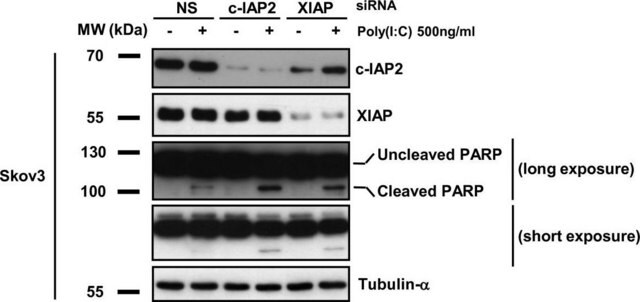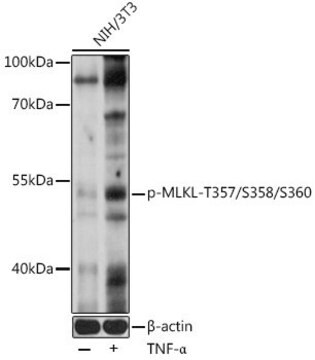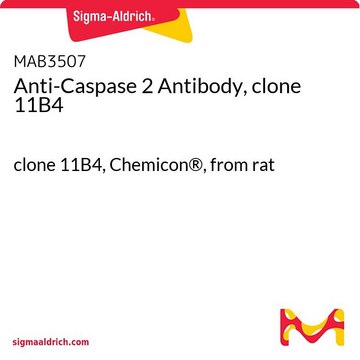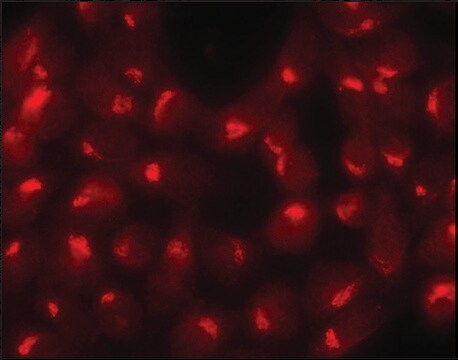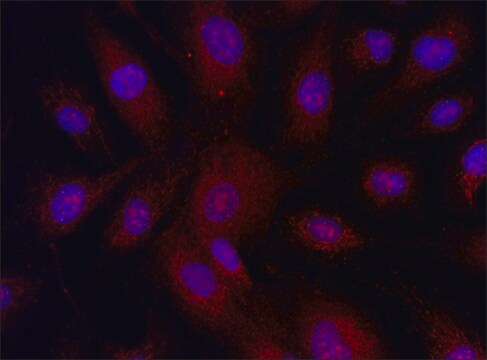おすすめの製品
由来生物
rat
品質水準
抗体製品の状態
purified antibody
抗体製品タイプ
primary antibodies
クローン
10C6, monoclonal
化学種の反応性
human, monkey, canine, mouse
メーカー/製品名
Chemicon®
テクニック
ELISA: suitable
flow cytometry: suitable
immunoprecipitation (IP): suitable
western blot: suitable
アイソタイプ
IgG2a
NCBIアクセッション番号
UniProtアクセッション番号
輸送温度
wet ice
ターゲットの翻訳後修飾
unmodified
遺伝子情報
human ... CASP2(835)
関連するカテゴリー
特異性
MAB3501 antibody recognizes a reactive epitope that lies in the P19 subunit of human Caspase-2 (ICH-1, Nedd-2).
免疫原
Raised against the P19 subunit of recombinant human Caspase-2 protein.
アプリケーション
Research Category
アポトーシス及び癌
代謝
アポトーシス及び癌
代謝
Research Sub Category
カスパーゼ
酵素及び生化学
カスパーゼ
酵素及び生化学
Anti-Caspase 2 Antibody, clone 10C6 detects level of Caspase 2 & has been published & validated for use in ELISA, FC, IP & WB.
Western blot: Recommended usage at 5 μg/ml, which has been found to detect endogenous Caspase-2 in 5 x 10E5 HeLa and MCF-7 cells.
Immunoprecipitation: Recommended concentration 1-5 μg/ml FACS: Recommended concentration 1 μg/ml. It is necessary to permeabilize the cell membrane prior to analysis.
EIA: Recommended concentration 0.5-1 μg/ml.
Immunohistochemistry: Use at 10-20 μg/ml. It is necessary to fix the cells in 4% Paraformaldehyde/0.18% Triton-X100 for 10 minutes prior to staining.
Optimal working dilutions must be determined by end user.
Immunoprecipitation: Recommended concentration 1-5 μg/ml FACS: Recommended concentration 1 μg/ml. It is necessary to permeabilize the cell membrane prior to analysis.
EIA: Recommended concentration 0.5-1 μg/ml.
Immunohistochemistry: Use at 10-20 μg/ml. It is necessary to fix the cells in 4% Paraformaldehyde/0.18% Triton-X100 for 10 minutes prior to staining.
Optimal working dilutions must be determined by end user.
関連事項
Replaces: 04-571
物理的形状
Format: Purified
Purified rat monoclonal antibody in buffer containing PBS, 0.1% Kathon.
保管および安定性
Maintain refrigerated at 2-8°C in undiluted aliquots for up to 12 months.
その他情報
Concentration: Please refer to the Certificate of Analysis for the lot-specific concentration.
法的情報
CHEMICON is a registered trademark of Merck KGaA, Darmstadt, Germany
免責事項
Unless otherwise stated in our catalog or other company documentation accompanying the product(s), our products are intended for research use only and are not to be used for any other purpose, which includes but is not limited to, unauthorized commercial uses, in vitro diagnostic uses, ex vivo or in vivo therapeutic uses or any type of consumption or application to humans or animals.
適切な製品が見つかりませんか。
製品選択ツール.をお試しください
シグナルワード
Warning
危険有害性情報
危険有害性の分類
Aquatic Chronic 2 - Eye Irrit. 2 - Skin Irrit. 2 - Skin Sens. 1
保管分類コード
12 - Non Combustible Liquids
WGK
WGK 3
引火点(°F)
Not applicable
引火点(℃)
Not applicable
適用法令
試験研究用途を考慮した関連法令を主に挙げております。化学物質以外については、一部の情報のみ提供しています。 製品を安全かつ合法的に使用することは、使用者の義務です。最新情報により修正される場合があります。WEBの反映には時間を要することがあるため、適宜SDSをご参照ください。
Jan Code
MAB3501:
試験成績書(COA)
製品のロット番号・バッチ番号を入力して、試験成績書(COA) を検索できます。ロット番号・バッチ番号は、製品ラベルに「Lot」または「Batch」に続いて記載されています。
M Seervi et al.
Cell death & disease, 2, e207-e207 (2011-09-09)
Mitochondrial cytochrome c (cyt. c) release and caspase activation are often impaired in tumors with Bcl-2 overexpression or Bax and Bak-defective status. Direct triggering of cell death downstream of Bax and Bak is an attractive strategy to kill such cancers.
Grace X Y Zheng et al.
PLoS genetics, 7(5), e1002054-e1002054 (2011-05-17)
MicroRNAs (miRNAs) post-transcriptionally regulate the expression of thousands of distinct mRNAs. While some regulatory interactions help to maintain basal cellular functions, others are likely relevant in more specific settings, such as response to stress. Here we describe such a role
BH3-only protein BIM mediates heat shock-induced apoptosis.
Mahajan, IM; Chen, MD; Muro, I; Robertson, JD; Wright, CW; Bratton, SB
Testing null
Girish Neelakanta et al.
PloS one, 7(3), e33447-e33447 (2012-03-20)
Drosophila melanogaster experience cold shock injury and die when exposed to low non-freezing temperatures. In this study, we generated transgenic D. melanogaster that express putative Ixodes scapularis antifreeze glycoprotein (IAFGP) and show that the presence of IAFGP increases the ability
M Mancini et al.
The Journal of cell biology, 149(3), 603-612 (2000-05-03)
Caspases are an extended family of cysteine proteases that play critical roles in apoptosis. Animals deficient in caspases-2 or -3, which share very similar tetrapeptide cleavage specificities, exhibit very different phenotypes, suggesting that the unique features of individual caspases may
ライフサイエンス、有機合成、材料科学、クロマトグラフィー、分析など、あらゆる分野の研究に経験のあるメンバーがおります。.
製品に関するお問い合わせはこちら(テクニカルサービス)




